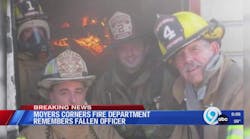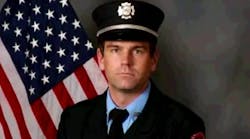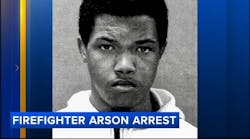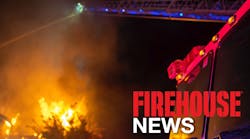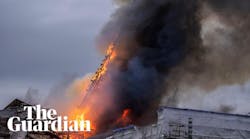I am sure we have all heard it around the kitchen table or at meeting night in our own fire stations, the great malady of all times in the fire service: “These new guys just aren’t the same…”; “Back in our day…” It really doesn’t matter if you are in a large city department or a small rural volunteer company, the fact is that the folks who are joining our organizations clearly are different and have some different values than those from days gone by. I also believe that we as fire officers, leaders and fire instructors have a missing ingredient that we are failing to provide. That ingredient is discipline.
Discipline takes on many forms and most of them seem to have a negative connotation. It is my belief that discipline can be the most valuable corrective and educational tool that we have in the fire service.
One definition of discipline is “the systematic training or subjection to authority especially the training of the mental, moral, and physical powers by instruction and exercise” (Funk & Wagnall’s). Wow, that doesn’t sound bad at all, does it? These are exactly the principles that we should foster in the fire service and our own departments. Since the fire service loves acronyms, I have created an acronym using the word DISCIPLINE that relates to something that we can all bring to the fire service. I have approached the acronym as something we all need and we can apply it from the officer point of view as well as the firefighter point of view. Take it and apply it as you see fit:
D – Determination. A company officer needs determination – and stamina. Enforcing rules and regulations is not easy, and having to revisit some issues time and time again can wear you down. As a firefighter, determination is what prevents you from becoming lax or nonchalant. You always buckle up, wear all of your personal protective equipment (PPE) and follow standard operating procedures (SOPs). This too can be challenging and it takes determination to continue to do this all the time.I – Integrity. If you are a company officer, all you have is your integrity. Your personnel should be able to trust you and what you say. It is really that simple. Too many people take their personal integrity lightly. If you are a firefighter, your company officer must know that your personal integrity will allow him or her to trust you and your actions and abilities. For officers and firefighters, integrity means being truthful and forthright, and it also means looking at your abilities honestly.
S – Sincerity. “People don’t care how much you know until they know how much you care.” I saw this quote many years ago and I am unsure of its origin, but the sentiment is true. Fire officers must truly care about their members and members must care about each other and truly wish to become part of the team.
C – Competence. This is easily said, but not always done. Passing the test does not make you competent; your performance under stress in the field demonstrates it much better. As an officer, do you have technical ability and demonstrate a command presence? As a firefighter, do you keep your skills sharp and keep yourself current so that your shift officer is never embarrassed by your lack of knowledge, skills or abilities?
I – Initiative. Do you have to wait for written orders or “directive number 17” to come down from headquarters or are you a self-motivated starter who will get things done without supervision? Officers enjoy having firefighters on their group or engine company who show initiative and self motivation.
P – Pride. This is nothing more than caring about what you do, whether or not anyone is looking. It is about you, your appearance and your actions. It also applies to off-duty behavior. Personal pride as an officer or as a firefighter means a lot. It reflects in our behavior as others see us.
L – Loyalty. An officer should always show a pronounced sense of loyalty to the department and administration as you move up the ladder and chain of command. You should also show a sincere sense of loyalty to those who serve with you as subordinates and make you look good every day. That loyalty can be tough to balance between those who serve with you and those whom you serve. There is a difference between loyalty and blind allegiance. Loyalty involves a conscious desire to achieve the goals of leadership, and blind allegiance means following folks even when we know they may be wrong.
I – Instructing. A primary job of an officer or a senior firefighter is to help mentor, train and instruct others along the way. There is nothing that will help improve the fire service more than the sharing of knowledge, skills and experience between folks who have the skills and those new students who are trying to learn them.
N – Nimble. Officers and firefighters really suffer when it comes to this. We must be nimble and ready, willing and able to make changes much faster than we do. Factors that affect our ability to be nimble include the size of our department and the number and length of long-standing traditions and/or practices. Officers and firefighters must be operationally nimble, but also mentally ready to adjust their personal and professional courses as things change around them. You know, change – like, for instance, the new recruits who are coming to us now.
E – Enthusiasm. There is no easy way to hide your personal enthusiasm for the job – or, for that matter, your lack of enthusiasm. Officers and firefighters who show enthusiasm and passion for the job will find that it is truly contagious and benefits an organization, shift, or department. Enthusiasm cannot be faked nor forced upon anyone. It is the job of officers and firefighters to help foster and spread enthusiasm.
To me, the answer is clear: Whether or not you choose the dictionary definition of discipline as systematic training or subjection to authority, or choose to implement my DISCIPLINE acronym, the fire service may be a better place for your actions. Discipline in whatever form applies to us personally, as an engine or ladder company officer or member, as a group, shift or platoon member and even right to the top as a an entire department. That means that you can do something about it without anybody else’s help. You don’t need the chief, the captain, mayor or city manager. We can all apply a little more discipline to the fire service and maybe there will be something new to talk about at the kitchen table.
Chief Concerns is a forum addressing issues of interest to chief fire officers. Opinions expressed are those of the writer. We invite all volunteer and career chief fire officers to share their concerns, experiences and views in this column. Please submit articles to Chief Concerns, Firehouse Magazine, 3 Huntington Quadrangle, Suite 301N, Melville, NY 11747 or to [email protected], with “Chief Concerns” in the subject line.
Peter Lamb will present “Crew Survivability Concepts“ and “Basic Company Tactics” at Firehouse Expo 2005, July 26-31 in Baltimore.Peter Lamb is chief of the North Attleboro, MA, Fire Department. He began his fire service career more than 20 years ago as a volunteer firefighter, then was a career firefighter with the Harris Fire District in Coventry, RI, where he eventually became chief. Lamb then was chief of the Tiverton, RI, Fire Department for 10 years until he became recruit coordinator for the Department of Fire Services, Massachusetts Firefighting Academy. He then served as manager of Program Development, Certification and Staff Services for the agency and later as director of the Massachusetts Firefighting Academy.